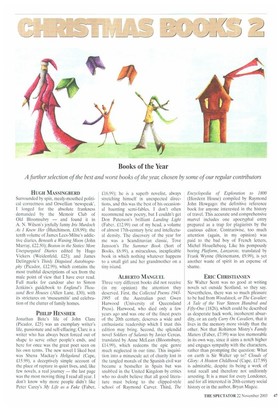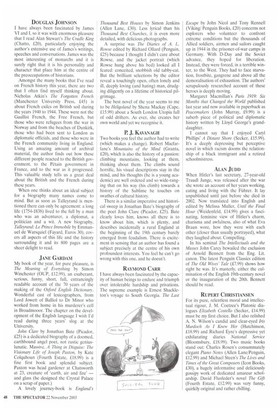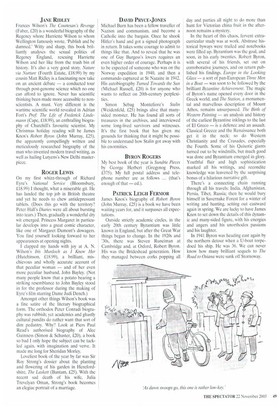Books of the Year
A further selection of the best and worst books of the year, chosen by some of our regular contributors
HUGH MAS SINGBERD Surrounded by spin, mealy-mouthed political correctness and Orwellian 'newspeak', I longed for the absolute frankness demanded by the Memoir Club of Old Bloomsubry — and found it in A. N. Wilson's joyfully funny Iris Murdoch As I Knew Her (Hutchinson, £18.99); the tenth volume of James Lees-Milne's addictive diaries, Beneath a Waning Moon (John Murray, £22.50); Beaton in the Sixties: More Unexpurgated Diaries edited by Hugo Vickers (Weidenfeld, £25); and James Delingpole's Thinly Disguised Autobiography (Picador, £12.99), which contains the most truthful descriptions of sex from the male point of view that I have ever read. Full marks for candour also to Simon Jenkins's guidebook to England's Thousand Best Houses (Allen Lane, £30), with its strictures on `museumitis' and celebration of the clutter of family homes.
PHILIP HENSHER Jonathan Bate's life of John Clare (Picador. £25) was an exemplary writer's life, passionate and self-effacing; Clare is a writer who has always been forced out of shape to serve other people's ends, and here for once was the great poet seen on his own terms. The new novel I liked best was Shena Mackay's Heligoland (Cape, £15.99), a deceptively simple account of the place of rapture in quiet lives, and, like few novels, a real journey — the last page was the most moving thing I read all year. I don't know why more people didn't like Peter Carey's My Life as a Fake (Faber,
£16.99); he is a superb novelist, always stretching himself in unexpected directions, and this was the best of his occasional haunting semi-fables. I don't often recommend new poetry, but I couldn't get Don Paterson's brilliant Landing Light (Faber, £12.99) out of my head, a volume of almost 17th-century lyric and intellectual density. The discovery of the year for me was a Scandinavian classic, love Jansson's The Summer Book (Sort of Books, £6.99), a miraculous, inexplicable book in which nothing whatever happens to a small girl and her grandmother on a tiny island.
ALBERTO MANGUEL Three very different books did not receive (in my opinion) the attention they deserved. First, the Collected Poems 19431995 of the Australian poet Gwen Harwood (University of Queensland Press). Harwood, who died only a few years ago and was one of the finest poets of the 20th century, deserves a wide and enthusiastic readership which I trust this edition may bring. Second, the splendid novel Soldiers of Salamis by Javier Cercas, translated by Anne McLean (Bloomsbury, £14.99), which redeems the epic genre much neglected in our time. This inquisition into a minuscule act of charity lost in the tangled morals of the Spanish civil war became a bestseller in Spain but was snubbed in the United Kingdom by critics who no doubt believe that all good literature must belong to the clipped-style school of Raymond Carver. Third, The Encyclopedia of Exploration to 1800 (Hordern House) compiled by Raymond John Howgago: the definitive reference book for anyone interested in the history of travel. This accurate and comprehensive marvel includes one apocryphal entry prepared as a trap for plagiarists by the cautious editor. Contrariwise, too much attention (again, in my opinion) was paid to the bad boy of French letters, Michel Houellebecq. Like his pompously boring Platform, Lanzarote, translated by Frank Wynne (Heinemann, £9.99), is yet another waste of spirit in an expense of shame.
ERIC CHRISTIANSEN Sir Walter Scott was no good at writing novels set outside Scotland, so they say. Nevertheless, there was so much pleasure to be had from Woodstock, or The Cavalier: A Tale of the Year Sixteen Hundred and Fifty-One (1826), which could be described as desperate hack work, incoherent absurdity, or an early Carty On Cavaliers, that it lives in the memory more vividly than the other. Not that Rohinton Mistry's Family Matters (Faber, £7.99) was less memorable in its own way, since it aims a notch higher and engages sympathy with the characters, rather than prompting the question: What on earth is Sir Walter up to? Clouds of Glory: A Hoxton Childhood (Cape, £17.99) is admirable, despite its being a work of total recall and therefore not uniformly arresting. It is a must for every Londoner, and for all interested in 20th-century social history or in the author, Bryan Magee. DOUGLAS JOHNSON I have always been fascinated by James VI and I, so it was with enormous pleasure that I read Alan Stewart's The Cradle King (Chatto, £20), particularly enjoying the author's extensive use of James's writings, speeches and conversations. James was the most interesting of monarchs and it is surely right that it is his personality and character that place him at the centre of the preoccupations of historians. Amongst the many books that I've read on French history this year, there are two that I often find myself thinking about. Nicholas Atkins The Forgotten French (Manchester University Press, £45) is about French exiles on British soil during the years 1940 to 1944. These were not the Gaullist French, the Free French, but those who were refugees from the war in Norway and from the beaches of Dunkirk, those who had been sent to London as diplomatic officials, and those who were in the French community living in England. Using an amazing amount of archival material, the author finds out how these different people reacted to the British government, to the Petain government in France, and to the war as it progressed. This valuable study tells us a great deal about the British and the French during these years. When one thinks about an ideal subject for a biography many names come to mind. But as soon as Talleyrand is mentioned there can only be agreement: a long life (1754-1838) lived to the full by a man who was an adventurer, a diplomat, a politician and a wit. A new biography, Talleyrand: Le Prince Immobile by Emmanuel de Warsquiel (Fayard, Euros 30), covers all aspects of this life and the history surrounding it and its 800 pages are a sheer delight to read.
JANE GARDAM My book of the year, for pure pleasure, is The Meaning of Everything by Simon Winchester (OUP, £12.99), an exuberant, serious, funny, short, full, entrancingly readable account of the 70 years of the making of the Oxford English Dictionary. Wonderful cast of lexicographers, from Lord Jowett of Balliol to Dr Minor who worked from home in his murderer's cell in Broadm000r. The chapter on the development of the English language I wish I'd read during three years' slog at the University. John Clare by Jonathan Bate (Picador, £25) is a dedicated biography of a doomed, earthbound angel poet, not rustic geniuslunatic. Massive. A Thing in Disguise: The Visionary Life of Joseph Paxton, by Kate Colquhoun (Fourth Estate, £18.99) is a fine first book and splendid subject. Paxton was head gardener at Chatsworth at 23, creature of 'earth, air and fire' — and glass (he designed the Crystal Palace on a scrap of paper.) A lovely journey-book is England's Thousand Best Houses by Simon Jenkins (Allen Lane, £30). Less lyrical than his Thousand Best Churches, it is even more detailed, with delicious photographs. A surprise was The Diaries of A. L. Rowse edited by Richard 01lard (Penguin, £25) because I thought I didn't care about Rowse, and the jacket portrait (which Rowse hung above his bed) looked all I feared: conceited, snobbish old tabby-cat. But the brilliant selections by the editor reveal a touchingly open, often lonely and ill, deeply loving (and hating) man, drudging diligently on a lifetime of historical pilgrimage. The best novel of the year seems to me to be Heligoland by Shena Mackay (Cape, £15.99) about a South London Utopia full of odd drifters. As ever, she creates her own world and yet we recognise it.
P. J. KAVANAGH
Two books you feel the author had to write (which makes a change). Robert Macfarlane's Mountains of the Mind (Granta, £20), which is also the history of a passion: climbing mountains, looking at them, thinking about them. The climbs sound horrific, his visual descriptions stay in the mind, and his thoughts (he is a young academic) are well ordered and so wide-ranging that on his way (his climb) towards a history of the Sublime he touches on swathes of cultural history. There is a similar imperative and historical sweep in Jonathan Bate's biography of the poet John Clare (Picador, £25). Bate clearly loves him, knows all there is to know about him, which is plenty, and describes incidentally a rural England at the beginning of the 19th century barely emerged from feudalism. There is excitement in sensing that an author has found a subject precisely at the centre of his own profoundest interests. You feel he can't go wrong with this one, and he doesn't.
RAYMOND CARR I have always been fascinated by the capacity of human beings to endure and triumph over intolerable hardship and privations. The supreme example is Ernest Shackleton's voyage to South Georgia. The Last Escape by John Nicol and Tony Rennell (Viking/ Penguin Books, £20) concerns not explorers who volunteer to confront extreme conditions but the thousands of Allied soldiers, airmen and sailors caught up in 1944 in the prisoner-of-war camps in Germany. With D-Day and the Soviet advance, they hoped for liberation. Instead, they were forced, in a terrible winter, to the West. They had to face starvation, frostbite, gangrene and above all the demoralisation of exhaustion. The authors' scrupulously researched account of these heroes is deeply moving. Margaret Macmillan's Paris 1979: Six Months that Changed the World published last year and now available in paperback as Peacemakers (John Murray, £9.99) is a suberb piece of political and diplomatic history written by Lloyd George's granddaughter. I cannot say that I enjoyed Caryl Phillips' A Distant Shore (Seeker, £15.99). It's a deeply depressing but perceptive novel in which racism dooms the relationship of a black immigrant and a retired schoolmistress.
ALAN JUDD When Hitler's last secretary, 27-year-old Traudl Junge, was released after the war she wrote an account of her years working, eating and living with the Ftihrer. It lay unpublished until just before she died in 2002. Now translated into English and edited by Melissa Muller, Until the Final Hour (Weidenfeld, £14.99) gives a fascinating, feminine view of Hitler's charm, charisma and awfulness, also of what Eva Braun wore, how they were with each other (closer than usually portrayed), what they laughed about. Compelling. In his seminal The Intellectuals and the Masses John Carey bewailed the exclusion of Arnold Bennett from the Eng. Lit. canon. The latest Penguin Classics edition of The Old Wives' Tale (£7.99) shows how right he was. It's masterly, either the culmination of the English 19th-century novel or the inauguration of the 20th. Bennett should be read.
RUPERT CHRISTIANSEN For its pure, relentless moral and intellectual rigour, J. M. Coetzee's Platonic dialogues Elizabeth Costello (Seeker, £14.99) must be my first choice. But I also relished A. N. Wilson's candid and clear-eyed Iris Murdoch As I Knew Her (Hutchinson, £18.99) and Richard Eyre's depressive yet exhilarating diaries National Service (Bloomsbury, £18.99). Two music books stand out: Charles Rosen's consummately elegant Piano Notes (Allen Lane/Penguin, £12.99) and Michael Steen's The Lives and Times of the Great Composers (Icon Books, £30), a hugely informative and deliciously gossipy work of dedicated amateur scholarship. David Flusfeder's novel The Gift (Fourth Estate, £12.99) was very funny, quirkily original and rather chilling. JANE RIDLEY Frances Wilson's The Courtesan's Revenge (Faber, £20) is a wonderful biography of the Regency whore Harriette Wilson to whom Wellington famously wrote, 'Publish and be damned.' Witty and sharp, this book brilliantly analyses the sexual politics of Regency England, rescuing Harriette Wilson and her like from the trash bin of history. It's also a very good story. Nature via Nurture (Fourth Estate, £18.99) by my cousin Matt Ridley is a fascinating new take on an ancient debate — a conducted tour through post-genome science which no one can afford to ignore. Never has scientific thinking been made more accessible to nonscientists. A must. Very different is the wartime scientific world revealed in Adrian Fort's Prof: The Life of Frederick Lindemann (Cape, £18.99), an enthralling biography of Churchill's favourite scientist. My Christmas holiday reading will be James Knox's Robert Byron (John Murray, £25), the apparently compellingly written and meticulously researched biography of the man who invented modern travel writing, as well as hailing Lutyens's New Delhi masterpiece.
ROGER LEWIS On my first whizz-through of Richard Eyre's National Service (Bloomsbury, £18.99) I thought, what a miserable git. He has landed the top job in British theatre and yet he needs to chew antidepressant tablets. (Does this go with the territory? Peter Hall's Diaries were all about bursting into tears.) Then, gradually a wonderful dry wit emerged. Princess Margaret in particular develops into a great comic character, like one of Margaret Dumont's dowagers. You find yourself looking forward to her appearances at opening nights.
I clapped my hands with joy at A. N. Wilson's Iris Murdoch as I Knew Her (Hutchinson, £18.99), a brilliant, mischievous and wholly accurate account of that peculiar woman — and of her even more peculiar husband, John Bayley. (Not many people know that a potato bearing a striking resemblance to John Bayley stood in for the professor during the making of Eyre's film starring Dame Judi Dench.)
Amongst other things Wilson's book was a fine satire of the literary biographical form. The orthodox Peter Conradi biography was rubbish; yet academics and ghastly cultural pundits do rather want that sort of dim pedantry. Why? Look at Piers Paul Read's authorised biography of Alec Guinness (Simon & Schuster, £20), a book so bad I only hope the subject can be tackled again, with imagination and verve. It made me long for Sheridan Morley.
Loveliest book of the year by far was Sir Roy Strong's dossier about the planting and flowering of his garden in Herefordshire, The Laskett (Bantam, £25). With the recent sad death of his wife, Julia Trevelyan Oman, Strong's book becomes an elegiac portrait of a marriage. DAVID PRYCE-JONES Michael Burn has been a fellow traveller of Nazism and communism, and become a Catholic into the bargain. Once he shook Hitler's hand and got a signed photograph in return. It takes some courage to admit to things like that. And to reveal that he was one of Guy Burgess's lovers requires an even higher order of courage. Perhaps it is to be expected of someone who was on the Norway expedition in 1940, and then a commando captured at St Nazaire in 1942. His autobiography Turned Towards the Sun (Michael Russell, £20) is for anyone who wants to reflect on 20th-century perplexities.
Simon Sebag Montefiores Stalin (Weidenfeld, £25) brings alive that manysided monster. He has found all sorts of treasures in the archives, and interviewed some long-lived survivors and witnesses. It's the first book that has given me grounds for thinking that it might be possible to understand how Stalin got away with his enormities.
BYRON ROGERS My best book of the year is Sundrie Pieces by George Herbert (Gregynog Press, £375). My full postal address and telephone number are as follows ... (that's enough of that — ed.).
PATRICK LEIGH FERNIOR James Knox's biography of Robert Byron (John Murray, £25) is a book we have been waiting years for, and it surpasses all expectations.
Outside strictly academic circles, in the early 20th century Byzantium was little known in England, but after the Great War things began to change. In the 1920s and '30s, there was Steven Runciman at Cambridge and, at Oxford, Robert Byron. His was the Brideshead generation. How they managed between corks popping all day and parties all night to do more than hunt for Victorian china fruit in the afternoon remains a mystery.
In the heart of this chaos, fervent extracurricular study was at work. Abstruse historical byways were trailed and notebooks were filled up. Byzantium was the goal, and soon, in his early twenties. Robert Byron, with several of his friends, set out on corroborative journeys, and on return published his findings. Europe in the Looking Glass — a sort of pan-European Three Men in a Boat — was soon to be followed by the brilliant Byzantine Achievement. The magic of Byron's name opened every door in the Greek world, and The Station, a monumental and marvellous description of Mount Athos, remains unsurpassed, The Birth of Western Painting — an analysis and history of the earliest Byzantine inklings to the last of El Greco — is a defence and an assault. Classical Greece and the Renaissance both get it in the neck; so do Western Christianity and the Crusades, especially the Fourth. Some of his Quixotic giants turned out to be windmills, but much good was done and Byzantium emerged in glory. Youthful flair and high sophistication marked all his writings, and recondite knowledge was leavened by the surprising bonus of a hilarious narrative gift.
There's a connecting chain running through all his travels: India, Afghanistan, Persia, Tibet, Russia; then he would bury himself in Savernake Forest for a winter of writing and hunting, setting out eastward again in spring. We are lucky to have James Knox to set down the details of this dynamic and many-sided figure, with his energies and angers and his unorthodox passions and his laughter.
In 1941 Byron was heading east again by the northern detour when a U-boat torpedoed his ship. He was 36. We can never know how many brilliant sequels to The Road to Oxiana were sunk off Stornoway.




























































































 Previous page
Previous page